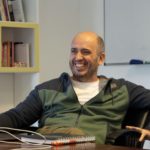Last week, Oppenheimer took home a whopping 7 Oscars. To me, that is more than just a movie win. It’s like the Academy is nudging us towards a deeper conversation, an age-old dilemma: capability versus ethics. It’s like they’re shining a spotlight not just on the movie itself, but on the broader question of whether just because we can do something, it means we should. And while I expect our collective future to be very different to the one portrayed by Christopher Nolan, I think the conversations we’ll need to have increasingly more and more are about the morality of what we can do.
Don’t get me wrong. I believe that the best moment in history to be alive is right now. We’re living in an era where change is practically our middle name, and it’s happening faster than ever, more than it has ever happened in a single generation before. For folks like me who thrive on risk, it’s exhilarating. Sure, it might feel like a rollercoaster for the risk-averse, triggering that primal fight-or-flight response. But if you’re like me, always seeking the thrill of stepping out of your comfort zone, this is the ride of a lifetime.
Lately, I’ve been diving into Amy Webb’s work, particularly her book “The Signals Are Talking”. She’s got this fascinating take that flips our perspective on the future. Instead of seeing it as something that just happens to us, she argues that we’re the ones shaping it. As the CEO of the Future Today Institute, her words hit home even harder. It’s a reminder that the future isn’t some distant concept; it’s ours to mold. Sure, it takes a bit of a knack for future-gazing, but it’s a skill we can all develop with practice. Just don’t forget to come back to the present moment, whatever it takes – meditation, a brisk walk, you name it.
The beauty of our time lies in our ability to craft better futures. There’s no inherent morality baked into the technologies we create; it’s all about how we wield them. And let’s not overlook the fact that humanity has never been more united in tackling challenges. With technology becoming more accessible and information more democratized, the playing field has never been more level. It’s like we’re all modern-day explorers, venturing into uncharted territories, making our fair share of blunders along the way.
But as we continue to push the boundaries of what’s possible, it’s crucial that we acknowledge the weight of our actions. As we push the boundaries of what’s possible, we can’t ignore the ethical questions that come with it. It’s not just about whether we can do something anymore; it’s about whether we should. These conversations, much like the ones sparked by Oppenheimer, force us to confront the very essence of what it means to be human – our beliefs, our values, our diverse forms of knowledge. And that’s where education plays a crucial role. We need to equip ourselves and our future generations with the tools to think critically, design thoughtfully, anticipate the future, and communicate effectively.
Now, when it comes to companies, the same principles apply. I want Arionkoder to shape futures – but not just any futures. They’ve got to be futures that uplift humanity as a whole. Too many companies have shaped the future without considering the broader impact. That’s why my team and I are on a mission to make Arionkoder unperishable. Our purpose is never-ending because there will always be a future to shape. If you share this vision, I’d love for you to join us in building a legacy that stands the test of time.
